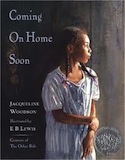By Jeanne Gilliam Fain & Christina Davidson
 At the beginning of the 2012-2013 school year, Christina Davidson (fourth grade teacher) and I (teacher educator) decided to collaboratively examine how fourth graders in the reading/language arts block develop critical perspectives of literature. Critical literacy research informed our understanding of building intentional space in an already jam-packed literacy curriculum that explored and wrestled with issues of power (Vasquez, Tate, & Harste; 2013). Christina teaches in a rural school located two hours outside of Nashville, Tennessee. Fourth grade students understand the complexity of living in a small town and many often arrive with in-depth knowledge about the economy, government, farm animals, football, hunting, and religion. Their worldview is heavily influenced by the fact that several of the students rarely travel outside of their town. This blog provides an overview of how we worked under a critical literacy frame and grappled with using literature in the classroom to encourage students to develop a critical perspective.
At the beginning of the 2012-2013 school year, Christina Davidson (fourth grade teacher) and I (teacher educator) decided to collaboratively examine how fourth graders in the reading/language arts block develop critical perspectives of literature. Critical literacy research informed our understanding of building intentional space in an already jam-packed literacy curriculum that explored and wrestled with issues of power (Vasquez, Tate, & Harste; 2013). Christina teaches in a rural school located two hours outside of Nashville, Tennessee. Fourth grade students understand the complexity of living in a small town and many often arrive with in-depth knowledge about the economy, government, farm animals, football, hunting, and religion. Their worldview is heavily influenced by the fact that several of the students rarely travel outside of their town. This blog provides an overview of how we worked under a critical literacy frame and grappled with using literature in the classroom to encourage students to develop a critical perspective.
We set out to intentionally disrupt some of the everyday beliefs that many of the students regularly take for granted (Vasquez, Tate, & Harste, 2013). Three picture books started off our exploration. I started off the fourth grade discussion in the reading/language arts blocks by reading and leading a discussion about Deborah Hopkinson’s, Saving Strawberry Farm (2005). This book explores a Midwestern farming community’s struggle to survive the 1933 Depression. Davy, the main character, leads the community efforts in saving Miss Elsie’s strawberry farm. The students listened intently to the book and when we moved to the book discussion the discussion fell flat. I kept trying to scaffold their talk, build upon their responses, and move our discussion to the critical. The fourth graders politely answered my questions and “did school” as they had learned to do. Their answers to my questions relied on evidence from the text and directly related to story elements. These elements are important for students to know and we were hoping that the students would extend this knowledge and discuss the complex themes of poverty, social action, and the effects of the economy on the community from the book. Christina took notes and we both agreed that we needed to start anew in how we approached literature discussion with critical texts.
 The second discussion focused upon Jacquelyn Woodson’s, The Other Side (2001). Christina led this literature discussion and the students connected with becoming friends with someone who is different from you. They began to explore the significance of the adult’s rules and how these rules ultimately affected the girls’ friendship. Students gradually initiated talk about discrimination, family rules, and issues of equity.
The second discussion focused upon Jacquelyn Woodson’s, The Other Side (2001). Christina led this literature discussion and the students connected with becoming friends with someone who is different from you. They began to explore the significance of the adult’s rules and how these rules ultimately affected the girls’ friendship. Students gradually initiated talk about discrimination, family rules, and issues of equity.
 Christina then moved to sharing Woodson’s, Each Kindness (2012). In this book, Woodson skillfully writes about how Chloe and her friends reject the new girl, Maya, in her class. Chloe later learns that she should display kindness to everyone and she doesn’t get a chance to reconnect with Maya. The fourth graders’ discussion gravitated toward the book’s ending that disrupted their ideas of happy endings and friends learning their lessons with positive outcomes. Literature brought the fourth graders together as a community and there was a shift in the talk toward unraveling the deeper themes across the texts.
Christina then moved to sharing Woodson’s, Each Kindness (2012). In this book, Woodson skillfully writes about how Chloe and her friends reject the new girl, Maya, in her class. Chloe later learns that she should display kindness to everyone and she doesn’t get a chance to reconnect with Maya. The fourth graders’ discussion gravitated toward the book’s ending that disrupted their ideas of happy endings and friends learning their lessons with positive outcomes. Literature brought the fourth graders together as a community and there was a shift in the talk toward unraveling the deeper themes across the texts.
References:
Hopkinson , D. (2005). Saving Strawberry Farm. New York, NY: Greenwillow Books.
Vasquez, V.M., Tate, S.L., and Harste, J.C. (2013). Negotiating Critical Literacies with Teachers: Theoretical Foundations and Pedagogical Resources for Pre-service and In-service Contexts. New York, NY: Routledge.
Woodson, J. (2001). The Other Side. New York, NY: GP Putnam’s Sons.
Woodson, J. (2012). Each Kindness. New York, NY: Nancy Paulsen Books.
Please visit wowlit.org to browse or search our growing database of books, to read one of our two on-line journals, or to learn more about our mission.
- Themes: Christina Davidson, Early Literacy, Jeanne Gilliam Fain
- Descriptors: Student Connections, WOW Currents
